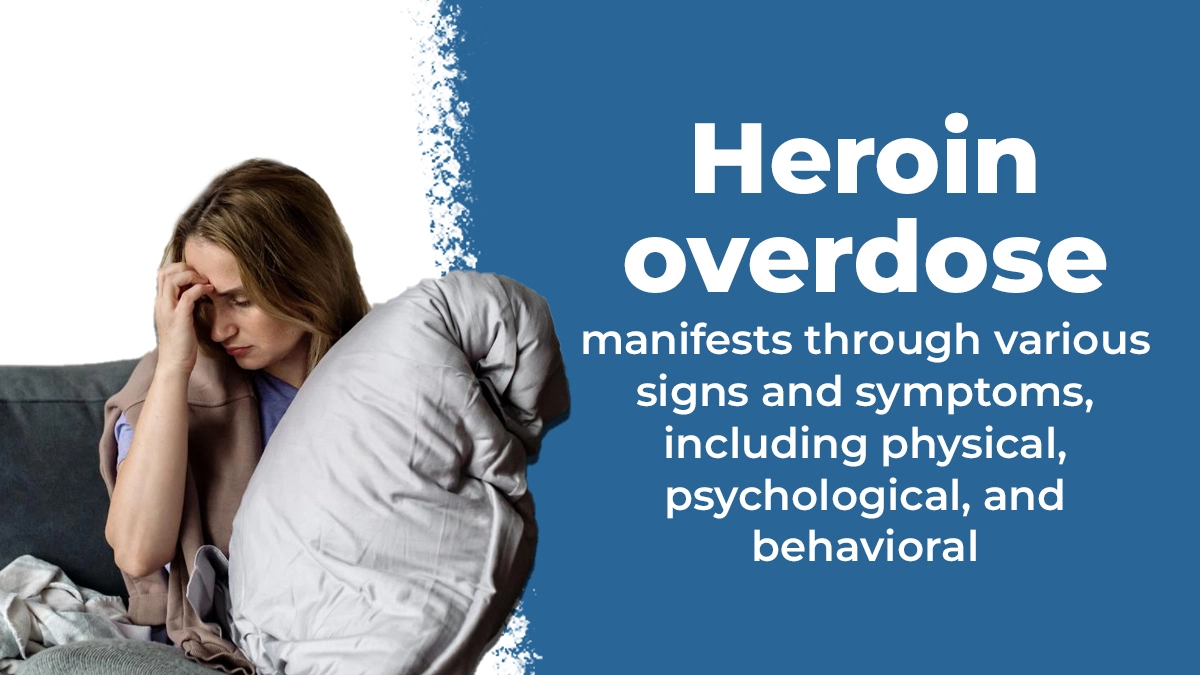Heroin Overdose: Signs You Shouldn’t Ignore
A heroin overdose occurs when someone takes an excessive amount of heroin, leading to severe, potentially fatal effects on the body. It happens because heroin depresses the central nervous system (CNS), slowing down vital functions like heart rate and breathing.
Heroin overdose manifests in the form of various symptoms, including physical, psychological, and behavioral changes. This article will delve deeper into these symptoms, providing insights into what to look for and how to respond in case of a heroin overdose.
Key Takeaways
A heroin overdose occurs when too much heroin overwhelms the body, leading to life-threatening effects. Here is what you need to know:
- Heroin overdose manifests through various signs and symptoms, including physical, psychological, and behavioral.
- Overdosing on heroin can result in both immediate effects and also long-term, severe health consequences.
- In case of a drug overdose, it is crucial to respond immediately, such as calling emergency services, to save a life.
Contact The Recovery Team at (800) 817-1247 to embark on a journey toward a life free from substance use disorder (SUD).
Signs of Heroin Overdose: What You Need to Know
Recognizing the signs of a heroin overdose is vital for timely intervention. Here are the physical, psychological, and behavioral signs associated with a heroin overdose:
Physical Signs
Physical manifestations of a heroin overdose can include:
- Shallow or No Breathing: Respiratory depression is a common and life-threatening symptom of a heroin overdose.
- Blue Lips or Fingertips: Cyanosis, a bluish tint to the skin, especially around the lips and fingertips, due to lack of oxygen.
- Pinpoint Pupils: Constricted or pinpoint pupils are a classic sign of opioid overdose, including heroin.
- Weak Pulse: A weak or slow pulse may be present due to the overall depressant effect of heroin on the cardiovascular system.
- Cold, Clammy Skin: Skin may feel cold and clammy due to decreased blood flow.
- Nausea and Vomiting: Heroin overdose can cause nausea and vomiting, contributing to dehydration and a higher risk of aspiration.
Psychological Signs
Psychological indicators of a heroin overdose include:
- Confusion or Disorientation: Being unable to focus, follow conversation, or understand surroundings.
- Extreme Drowsiness: Heroin use can cause drowsiness, but during an overdose, it may progress to extreme lethargy or unconsciousness.
- Dizziness or Fainting: Feeling lightheaded, dizzy, or fainting.
- Hallucinations or delusions: In some instances, heroin overdose can result in hallucinations or delusional thinking.
- Severe Mood Swings: They might rapidly swing between extreme emotions, such as intense euphoria, followed by severe depression.
- Incoherent Thoughts: Inability to articulate thoughts clearly or coherently.
Behavioral Signs
The behavioral signs of a heroin overdose can vary but often include:
- Unresponsiveness: The person might not respond to attempts to wake them or communicate with them.
- Slurred Speech or Difficulty Speaking: Their speech might be slow, slurred, or incoherent.
- Erratic or Slowed Movements: Motor skills might be significantly impaired.
- Changes in Consciousness: They might drift in and out of consciousness or seem disoriented.
- Inability to Focus or Maintain Attention: They might have difficulty concentrating or maintaining a conversation.
- Changes in Usual Habits or Behavior: Heroin overdose might lead to changes in behavior that are not typical for the individual, such as suddenly becoming uncommunicative or withdrawn.
Remember, these signs of an overdose can vary in intensity and may not all be present. However, recognizing even a few of these signs in someone using heroin can indicate a medical emergency.
Dangers of Heroin Overdose
Heroin overdose presents immediate and long-term health risks that can be severe and life-threatening. Here are some of the risks and dangers associated with a heroin overdose:
Immediate Health Risks
Heroin suppresses the central nervous system (CNS), leading to slowed breathing or respiratory depression. During an overdose, breathing can become dangerously slow or stop altogether, leading to hypoxia and potential brain damage within minutes.
Another risk associated with overdosing on heroin includes a rapid drop in blood pressure and heart rate, leading to cardiovascular collapse. This can result in cardiac arrest, a life-threatening condition that demands immediate medical attention.
Moreover, heroin overdoses often induce a state of unconsciousness or coma. Individuals may become unresponsive, making it challenging for bystanders or medical professionals to provide timely assistance.
Additionally, loss of consciousness increases the risk of aspiration, where vomit or saliva enters the lungs. This can lead to aspiration pneumonia, a severe condition that requires medical intervention.
Long-Term Health Risks
Prolonged heroin use, especially in high doses, can cause severe damage to vital organs like the liver and kidneys. Chronic drug abuse may lead to organ failure, requiring extensive medical treatment or transplantation.
Another risk that comes with long-term heroin use is the development of mental health disorders, such as depression and anxiety. The drug’s effects on brain chemistry can alter mood regulation and cognitive function.
In addition, heroin abuse is associated with higher risks of contracting infectious diseases like HIV/AIDS and hepatitis through needle sharing or risky behaviors. These diseases can have long-lasting implications on overall health and require ongoing medical management.
Furthermore, continued heroin use can lead to tolerance, requiring higher doses to achieve a similar effect. This often spirals into addiction, making it challenging to quit without professional help. Heroin addiction can lead to a cycle of health risks and personal turmoil.
How to Respond to a Heroin Overdose
When facing a heroin overdose situation, knowing how to respond promptly can be life-saving. Here’s a step-by-step guide on how to react effectively:
Access the Situation
The first thing to do is to check for responsiveness. If the person is unconscious and not breathing or their breathing is very shallow, they may be experiencing an overdose.
Call Emergency Services
The most important step when encountering a suspected heroin overdose is to call 911 immediately. Time is of the essence in these situations, and professional medical care is essential.
Administer Naloxone (If Available)
If naloxone, an opioid overdose-reversing medication, is accessible, administer it following the provided instructions. This medication can help reverse the effects of the overdose temporarily.
Perform CPR (If Necessary)
If the person remains unresponsive and shows no signs of breathing or a pulse, initiate CPR (Cardiopulmonary Resuscitation). Follow the proper CPR guidelines until emergency medical responders arrive.
Stay with the Person
Stay with the individual until emergency services arrive. Monitor their breathing and provide reassurance to keep them calm.
Provide Information to Emergency Responders
When medical help arrives, provide them with any information you have about the situation. Details about what the person took and any actions taken can assist medical personnel in providing appropriate care.
Remember, staying calm and taking swift action is crucial during a heroin overdose. Your quick response and communication with emergency services can significantly increase the chances of a positive outcome.
Inpatient Care for Heroin Addiction: A Holistic Approach
Inpatient treatment, or residential treatment, for heroin addiction often involves a comprehensive approach aimed at addressing the physical, psychological, and social aspects of addiction. Here are some components commonly found in inpatient programs:
Medical Detoxification
The initial phase often involves a medically supervised detox process to manage withdrawal symptoms safely. This step is essential as withdrawal from heroin can be intense and uncomfortable.
Therapy and Counseling
Inpatient programs typically offer individual and group therapy sessions. Behavioral therapies, like cognitive behavioral therapy (CBT), are commonly used to address the psychological aspects of addiction, helping individuals understand their triggers and develop coping strategies.
Medication-Assisted Treatment (MAT)
Inpatient programs also offer a medication-assisted treatment program (MAT) for those dealing with opioid use disorder (OUD), including heroin addiction. MAT incorporates FDA-approved medications, like methadone, buprenorphine, or naltrexone, with counseling and therapies to manage cravings and withdrawal symptoms.
Education and Skill Building
Inpatient treatment programs often provide education on addiction, relapse prevention therapy, and life skills training to help individuals develop strategies for managing stress, avoiding triggers, and rebuilding their lives after treatment.
Support Groups
Participation in support groups like Narcotics Anonymous (NA) or SMART Recovery might be encouraged. These groups offer ongoing support and a sense of community, which can be invaluable in maintaining sobriety post-treatment.
Aftercare Planning
A solid aftercare plan is vital for sustained recovery. This may involve an outpatient program, continued medication management, sober living arrangements, and ongoing support group attendance.
If you or someone you know is considering inpatient treatment, it’s a brave and positive step toward a healthier life. During this journey, support from loved ones and professionals can make a significant difference in achieving and sustaining recovery.
The Recovery Team: Where Healing Happens
Struggling with heroin addiction isn’t the end of your story; it’s a turning point towards a brighter, addiction-free life. At The Recovery Team, we are here with a caring hand and a full spectrum of support.
Our comprehensive treatment options offer diverse pathways to break free from drug use disorder. Through personalized therapy sessions and expert medication management, we guide you toward recovery, addressing every aspect of your journey.
Don’t wait—your new life awaits. Call us at (800) 817-1247 for more information about our programming.






